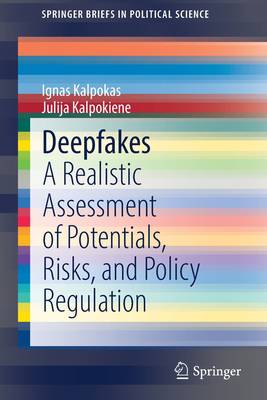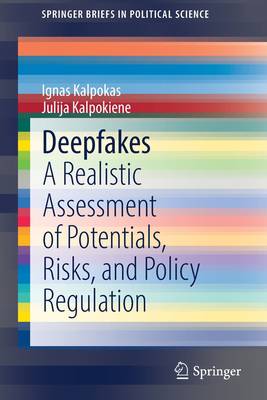
- Afhalen na 1 uur in een winkel met voorraad
- Gratis thuislevering in België vanaf € 30
- Ruim aanbod met 7 miljoen producten
- Afhalen na 1 uur in een winkel met voorraad
- Gratis thuislevering in België vanaf € 30
- Ruim aanbod met 7 miljoen producten
Zoeken
Deepfakes
A Realistic Assessment of Potentials, Risks, and Policy Regulation
Ignas Kalpokas, Julija Kalpokiene
€ 52,95
+ 105 punten
Omschrijving
This book examines the use and potential impact of deepfakes, a type of synthetic computer-generated media, primarily images and videos, capable of both creating artificial representations of non-existent individuals and showing actual individuals doing things they did not do. As such, deepfakes pose an obvious threat of manipulation and, unsurprisingly, have been the subject of a great deal of alarmism in both the news media and academic articles.
Hence, this book sets out to critically evaluate potential threats by analyzing human susceptibility to manipulation and using that as a backdrop for a discussion of actual and likely uses of deepfakes. In contrast to the usual threat narrative, this book will put forward a multi-sided picture of deepfakes, exploring their potential and that of adjacent technologies for creative use in domains ranging from film and advertisement to painting. The challenges posed by deepfakes are further evaluated with regard to present or forthcoming legislation and other regulatory measures. Finally, deepfakes are placed within a broader cultural and philosophical context, focusing primarily on posthumanist thought.
Therefore, this book is a must-read for researchers, students, and practitioners of political science and other disciplines, interested in a better understanding of deepfakes.
Hence, this book sets out to critically evaluate potential threats by analyzing human susceptibility to manipulation and using that as a backdrop for a discussion of actual and likely uses of deepfakes. In contrast to the usual threat narrative, this book will put forward a multi-sided picture of deepfakes, exploring their potential and that of adjacent technologies for creative use in domains ranging from film and advertisement to painting. The challenges posed by deepfakes are further evaluated with regard to present or forthcoming legislation and other regulatory measures. Finally, deepfakes are placed within a broader cultural and philosophical context, focusing primarily on posthumanist thought.
Therefore, this book is a must-read for researchers, students, and practitioners of political science and other disciplines, interested in a better understanding of deepfakes.
Specificaties
Betrokkenen
- Auteur(s):
- Uitgeverij:
Inhoud
- Aantal bladzijden:
- 87
- Taal:
- Engels
- Reeks:
Eigenschappen
- Productcode (EAN):
- 9783030938017
- Verschijningsdatum:
- 17/02/2022
- Uitvoering:
- Paperback
- Formaat:
- Trade paperback (VS)
- Afmetingen:
- 156 mm x 234 mm
- Gewicht:
- 145 g

Alleen bij Standaard Boekhandel
+ 105 punten op je klantenkaart van Standaard Boekhandel
Beoordelingen
We publiceren alleen reviews die voldoen aan de voorwaarden voor reviews. Bekijk onze voorwaarden voor reviews.











